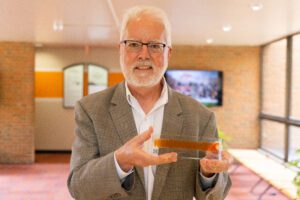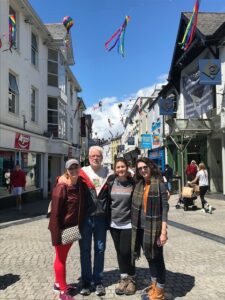 School of Communication Studies Director and Associate Professor John Haas had just earned tenure when he was asked to step into a leadership role. In 1995, it was as head of the Department of Speech Communication in the College of Liberal Arts—and a lot more than just names and locations have changed in that time. Now, Haas is stepping down from the director position after 27 years.
School of Communication Studies Director and Associate Professor John Haas had just earned tenure when he was asked to step into a leadership role. In 1995, it was as head of the Department of Speech Communication in the College of Liberal Arts—and a lot more than just names and locations have changed in that time. Now, Haas is stepping down from the director position after 27 years.
“When I think back 27 years, on the one hand I feel like I woke up this morning and I’m almost back in ‘95, it doesn’t feel like 27 years have passed; but then I think back some more and a lot of things have changed,” he said.
It was Haas’ who pushed for the department to move into the College of Communication and Information (CCI) in 1997, which allowed what became the School of Communication Studies to grow a graduate program and to flourish. The School has grown over the years in both student body and faculty—it will have almost doubled its faculty to 13 members starting in fall 2022, and it currently boasts the highest number of undergraduate majors and the highest class enrollment at CCI.
Creating Student Experiences
Another point of growth is Communication Studies’ participation in experiential trips and CCI’s Global Programs, which allows students to have educational experiences in places such as Washington D.C. and Dublin, Ireland. Communication Studies Associate Professor Laura Miller oversees the Ireland trip, and she said what impressed her most about Haas was his willingness to go the extra step to make students feel special.
 Haas joined the Ireland trip in summer 2019 and helped Miller co-teach the students that year, and Miller said the students were beyond excited that the director of their school took his summer to be with them. Miller also spoke about how Haas would drive a van full of students to places such as Nashville or Chattanooga so they could network with alumni and have a variety of unique educational engagements.
Haas joined the Ireland trip in summer 2019 and helped Miller co-teach the students that year, and Miller said the students were beyond excited that the director of their school took his summer to be with them. Miller also spoke about how Haas would drive a van full of students to places such as Nashville or Chattanooga so they could network with alumni and have a variety of unique educational engagements.
“He’s very involved in the students’ experience: he teaches classes, he leads experiences, and he knows students quite well. He has his door open, he’s involved, he loves students and getting to know students and he’s available to them. Students know him and respect him, and he’s had an impact on so many different students,” Miller said.
While Haas will often take a question asking about his accomplishments and answer it by talking about what the School has done as a whole, there is one point of personal pride he’ll point out from his time as director: Haas’ former student and NFL quarterback Peyton Manning donated $1 million in 2018 to create the John Haas Student Experiential Learning Endowment.
Manning intended those funds to create experiences for students, so when the COVID-19 pandemic hit and halted travel, Haas began thinking of ways he could still provide experiences for students. That’s when he decided to start working on an app that would be a counterpart to the Public Speaking Center, which Haas also established during his time as director. The app, which will soon be available at the App Store, will provide a resource to UT students as well as the general public in Tennessee on how to prepare and deliver effective presentations. The app also includes information to assist ESL students, K-12 students, and returning military.
Building Lasting Friendships
One of the people who knows very well what an impact Haas has on students is Amy Donahue (’09). Donahue grew close to Haas during her undergraduate years as she took several courses from him and also participated in the Communication Studies Club, which Haas advised. When Donahue’s father died in the summer between her sophomore and junior year, she felt lost and went to Haas’ office to discuss how she was doing.
“John first said, ‘Do you feel like you want to continue with classes or do you need to take a break?’ I said I wanted to keep going and what John did was fantastic—I think he saw me and knew me and instead of sort of coddling, he really challenged me to dig in and do more and become more involved,” she said. “That was the start of the conversation about me taking over the Communication Studies Club. In a time where I needed direction, he was there.”
He was there for Donahue again when she graduated in the middle of an economic crash and was weighing whether to enter the workforce or to continue her education; she chose to get her master’s degree. Haas was not only her thesis chair and sometimes instructor, but he also oversaw her assistantship during that time.
 Throughout it all, their relationship continued to grow, to the point where Haas took the place of Donahue’s father at her wedding for what would have been her father-daughter dance. While Donahue knows their relationship is unique, she also says she always sees Haas go out of his way to get to know students and be available to them.
Throughout it all, their relationship continued to grow, to the point where Haas took the place of Donahue’s father at her wedding for what would have been her father-daughter dance. While Donahue knows their relationship is unique, she also says she always sees Haas go out of his way to get to know students and be available to them.
“I think on a microlevel he cares so deeply about the people around him, whether it’s students or colleagues. But on an even higher level, he cares so much about the university and making sure the program itself is of high quality. When people hear that someone got a degree from Communication Studies from the University of Tennessee, Knoxville, he wants that to mean something,” Donahue said.
Haas has also impacted colleagues at UT and beyond as he’s taken on various roles throughout the years, including serving as interim director of the Tombras School of Advertising and Public Relations for a period. There, he worked with Beth Foster, the current director of ADPR, who said Haas has been one of the most steadfast and valuable colleagues and mentors she’s ever had.
“I have had the great privilege of working with him as my director in ADPR and then later as a colleague in leadership. In each capacity, he has been an aspirational role model to me. At every stage in my career, John Haas has been a rock of advice, support, and encouragement,” Foster said.
Continuing Work
While Haas is stepping down as director he will still continue on as faculty for the School of Communication Studies. He never stopped teaching a full load of classes, so the time his directorship consumed is now available for him to pursue research.
“I only had a short amount of time to be a regular faculty member and I’m really looking forward to that in some ways because I have some research projects. I’m really looking forward to being able to focus,” he said.
Communication forms have changed considerably in 27 years, since the time Haas would have first been conducting research. The advent of the internet has provided fertile ground for his interests, and he’s excited to continue expanding on past work as well as to open doors on new topics. His research has focused on hate speech, which grew out of his own mother’s experiences living as a German immigrant in the United States during World War II.
“I would talk with my mother about this and she made it clear that what happened in Germany could happen anywhere. I said, oh no, there must be something special about Germans and she’d say no, at some point you’ll see things differently,” Haas said.
Haas eventually did see his mother’s point, and he co-wrote a book on the topic with Michael Waltman of the University of North Carolina, The Communication of Hate, which received the National Communication Association’s Franklyn S. Haiman Award for Distinguished Scholarship in Freedom of Expression in 2012.
Haas’ future research will involve exploring large datasets about hate speech through the lens of social identity theory. This theory states that people categorize other people, but most people are able to suppress this impulse to stereotype; but some people cannot repress those negative evaluations of others and it results in racism and other hateful speech and acts. Haas said his research intends to explore if it is possible to inoculate people against hate speech.
As for stepping down from his position and putting the School in someone else’s hands—in this case, new Director Jon Hess—Haas knows his and his faculty’s past 27 years of work have positioned the School to succeed.
“It doesn’t seem like 27 years, but our program now, just like our college, it’s at a really great place,” Haas said.
